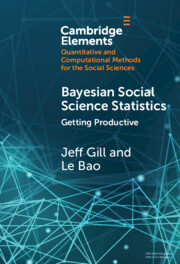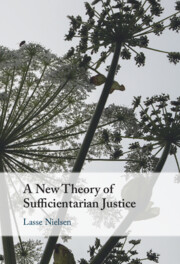Refine listing
Actions for selected content:
1295847 results in Books

Bayesian Social Science Statistics
- Getting Productive
- Coming soon
-
- Expected online publication date:
- December 2025
- Print publication:
- 31 January 2026
-
- Element
- Export citation

Education and Training as Improvement Interventions
- Coming soon
-
- Expected online publication date:
- December 2025
- Print publication:
- 08 January 2026
-
- Element
- Export citation

Johann Gottfried Herder: Letters for the Advancement of Humanity
- Coming soon
-
- Expected online publication date:
- December 2025
- Print publication:
- 22 January 2026
-
- Book
- Export citation

Australian Uniform Evidence Law
- Coming soon
-
- Expected online publication date:
- December 2025
- Print publication:
- 08 January 2026
-
- Textbook
- Export citation

The Ladder of the Sciences in Late Antique Platonism
- Selected Essays
- Coming soon
-
- Expected online publication date:
- December 2025
- Print publication:
- 08 January 2026
-
- Book
- Export citation

Clothing Bodies
- Weaving and Textiles in the Aegean Bronze Age
- Coming soon
-
- Expected online publication date:
- December 2025
- Print publication:
- 31 January 2026
-
- Element
- Export citation

The Phonetics of Tarifit
- Variation and Change in a Moroccan Amazigh Language
- Coming soon
-
- Expected online publication date:
- December 2025
- Print publication:
- 31 January 2026
-
- Element
- Export citation

Social Change across the End of the Aegean Bronze Age
- Coming soon
-
- Expected online publication date:
- December 2025
- Print publication:
- 08 January 2026
-
- Element
- Export citation

Five Economies of World Literature
- Coming soon
-
- Expected online publication date:
- December 2025
- Print publication:
- 31 December 2025
-
- Book
- Export citation
Syntactic Variation from Individuals to Populations
- Language as a Complex System
- Coming soon
-
- Expected online publication date:
- December 2025
- Print publication:
- 31 December 2025
-
- Element
- Export citation

Invisible Fatherland
- Constitutional Patriotism in Weimar Germany
- Coming soon
-
- Expected online publication date:
- December 2025
- Print publication:
- 22 January 2026
-
- Book
- Export citation

Linear Cryptanalysis
- Coming soon
-
- Expected online publication date:
- December 2025
- Print publication:
- 20 November 2025
-
- Book
- Export citation

Creative Construction Grammar
- Coming soon
-
- Expected online publication date:
- December 2025
- Print publication:
- 31 January 2026
-
- Element
- Export citation

Hume's A Treatise of Human Nature
- A Critical Guide
- Coming soon
-
- Expected online publication date:
- December 2025
- Print publication:
- 08 January 2026
-
- Book
- Export citation

Non-Canonical English Syntax
- Concepts, Methods, and Approaches
- Coming soon
-
- Expected online publication date:
- December 2025
- Print publication:
- 28 August 2025
-
- Book
- Export citation

Unicorns from Emerging Economies
- Creating Value through Technology and Innovation
- Coming soon
-
- Expected online publication date:
- December 2025
- Print publication:
- 08 January 2026
-
- Book
- Export citation

A New Theory of Sufficientarian Justice
- Coming soon
-
- Expected online publication date:
- December 2025
- Print publication:
- 31 January 2026
-
- Book
- Export citation

State Platform Capitalism
- The United States, China, and the Global Battle for Digital Supremacy
- Coming soon
-
- Expected online publication date:
- December 2025
- Print publication:
- 31 January 2026
-
- Element
- Export citation

After Anzac
- The Development of Australian Infantry on the Western Front, 1916–1918
- Coming soon
-
- Expected online publication date:
- December 2025
- Print publication:
- 17 December 2025
-
- Book
- Export citation

Youth Culture and Religion in Twenty-First Century Japan
- From Hyper-real to 2.5-Dimensional Religion
- Coming soon
-
- Expected online publication date:
- December 2025
- Print publication:
- 31 January 2026
-
- Element
- Export citation
